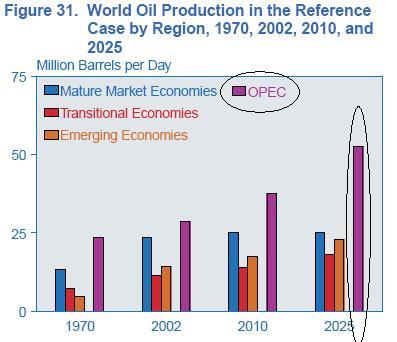The thing that Cedoz gets right - and it's an important thing - is this:
Today, however, the situation is quite different. Despite the cartel’s best efforts, mounting evidence points to the fact that OPEC has become increasingly ineffective in reining in high oil prices. And with the disappearance of the preferred “price band” for OPEC crude ($28-$32 per barrel), some wonder whether the cartel still has any interest at all in bringing prices down.So basically, OPEC's ability to influence the price of oil has evaporated because demand exceeds supply - OPEC was only able to control prices when supply exceeded demand. This is an important point, because the implication - if you follow it logically, and are intellectually honest - is that supply-side solutions are not going to work. Rather, we need to work on reducing demand domestically and internationally for oil if we want to bring prices down. Cedoz is either illogical or dishonest, because this is not the argument he makes. But more on that later.
This impotence derives from a confluence of factors. With estimates for crude oil demand steadily being revised upward, market fundamentals are working against the cartel. And with most of the additional supply to meet this demand projected to come from non-OPEC producers, the cartel is facing a dramatic diminution in influence. At the same time, political instability in OPEC’s primary region, the Persian Gulf, is working against investor confidence.
One of the biggest errors Cedoz makes is saying that most new production will come from non-OPEC sources, and this will diminish the importance of OPEC countries. While most new production may indeed come from non-OPEC sources, there's no way it will equal or surpass OPEC sources. It simply won't happen. Take this example from the Department of Energy's oil forecast for the next 20 years (PDF):

Basically, the balance shifts slightly, but OPEC is still the dominant player. Indeed, 2/3 of the world's oil reserves are in the Arab states, so it's silly to predict anything else. If anything, OPEC is liable to be more important in the future, as US, North Sea, and Russian production continue to wane.
As for Cedoz' proposed remedy, a "hemispheric" energy strategy is not going to weaken OPEC, for the very simple reason the 2 of the 3 largest energy producers in the hemisphere (Venezuela and Mexico) are members of OPEC. Hell, Venezuela was the driving force behind the creation of OPEC!
Ah, and this is where Cedoz' third sin is committed. Cedoz wastes a lot of ink on the potential of coal, tar sands, and shale. Coal is probably doable as things go, but it would be horrible. But let me go out and say something with an attempt at finality:
The United States will never, ever fuel more than a small portion of its oil needs from tar sands or shale.The reasons for this are simple. First of all, both shale and oil sands are almost net-energy losers. (Shale especially.) They've only been relatively affordable when natural gas was cheap, and it's a good question as to whether oil prices can rise fast enough to keep oil sand production profitable with natural gas prices where they're heading. That's assuming that natural gas production can even stay level, much less expand to the levels needed to quadruple production by 2020, like Cedoz predicts.
You can get a good feel for how illiterate Cedoz is on these issues when he writes:
Canadians have proven that, with patience, the brightest minds and a little bit of money can tackle the toughest energy challenges.Excuse me? A little money? Cedoz is apparently unaware of the billions - with a b - of dollars that oil sands production has gotten from every level of government, except possibly school boards. I'm not even sure oil sands production counts as "the brightest minds" working, considering the process hasn't really evolved beyond "Ug. Me dig hole. Put dirt in pot. Cook. Drive Hummer fast."
More broadly, this article shows the schizophrenia that American thinkers must be going through. Even the densest need to admit that energy insecurity is being caused by high demand and not enough supply. Nevertheless, they can't seem to break the habit of advocating supply-side solutions - in this case, massive increases in oil sands and Nigerian imports. Only the desperate would believe that this could work, as if the solution to alcoholism is to buy your hooch at Costco.
Of course, in a sense that is a solution, too.

No comments:
Post a Comment